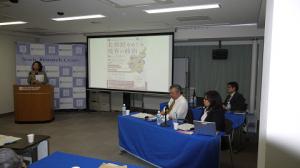
New! Summary of symposium "Border Politics that Surround North Korea"
2011/04/01
The GCOE program and Regional Powers project co-hosted an international symposium °»Border Politics of North Korea°… on March 13th, 2011. We had the pleasure and honour of inviting many distinguished scholars and practitioners from Korea and Japan to discuss issues regarding the North Korean border politics from various perspectives.
The keynote speech by Dr. Jeong Seok Lee, the former Korean Minister of Unification, explored the historical process of the North Korean and Chinese border (that stretches 1300km) demarcation process. This process was more advantageous for North Korea due to the historical and international environment of China at the time. He also introduced that the demarcation process also included the friendly conclusion by both countries that resulted in the joint usage of the river along the border which he obtained from historical documents. He concluded and emphasized that in the era when the East Asian countries including South Korea, Japan and China are working towards the formation of the framework for the Asian Union, it is more so important now to not isolate but engage North Korea
The international panel included three panellists from Korea and Japan. First speaker, Yoshinobu Mori (Saga Univ.) presented the notion of that the °»mutual interdependence of the two Koreas was manipulated to maintain the narrative of the divided peninsula°… and that although the Sunshine Policy was the beginning of the transformation of the inter-Korean relations, however, the current administration°«s North Korean policy has been experiencing serious setbacks in this regard. Haein Han (Kunkuk Univ.) presented her work on border politics in the Korean peninsula through the historical tracing of the North Korean diaspora in Sakhalin. She noted that the North Koreans who have returned to Korea are still experiencing discrimination and hardships due to the historical abandonment of them by both Korea and Japan. Ihkpyo Hong (KIEP) presented his work on the current status and future of the regional economic cooperation of the Northeastern provinces of China (Jilin, Heilongjiang, Liaoning).
All four presentations explored the North Korean issue through the prism of °»border politics°… and attempted to shed light on the region not through the overt emphasis of the potential threat and danger that the media has portrayed, but rather from the historical tracing and contemporary analysis of the social, political, and economic circumstances that surround not only the actual borders but also the psychological barriers that surround North Korea.


The keynote speech by Dr. Jeong Seok Lee, the former Korean Minister of Unification, explored the historical process of the North Korean and Chinese border (that stretches 1300km) demarcation process. This process was more advantageous for North Korea due to the historical and international environment of China at the time. He also introduced that the demarcation process also included the friendly conclusion by both countries that resulted in the joint usage of the river along the border which he obtained from historical documents. He concluded and emphasized that in the era when the East Asian countries including South Korea, Japan and China are working towards the formation of the framework for the Asian Union, it is more so important now to not isolate but engage North Korea
The international panel included three panellists from Korea and Japan. First speaker, Yoshinobu Mori (Saga Univ.) presented the notion of that the °»mutual interdependence of the two Koreas was manipulated to maintain the narrative of the divided peninsula°… and that although the Sunshine Policy was the beginning of the transformation of the inter-Korean relations, however, the current administration°«s North Korean policy has been experiencing serious setbacks in this regard. Haein Han (Kunkuk Univ.) presented her work on border politics in the Korean peninsula through the historical tracing of the North Korean diaspora in Sakhalin. She noted that the North Koreans who have returned to Korea are still experiencing discrimination and hardships due to the historical abandonment of them by both Korea and Japan. Ihkpyo Hong (KIEP) presented his work on the current status and future of the regional economic cooperation of the Northeastern provinces of China (Jilin, Heilongjiang, Liaoning).
All four presentations explored the North Korean issue through the prism of °»border politics°… and attempted to shed light on the region not through the overt emphasis of the potential threat and danger that the media has portrayed, but rather from the historical tracing and contemporary analysis of the social, political, and economic circumstances that surround not only the actual borders but also the psychological barriers that surround North Korea.








